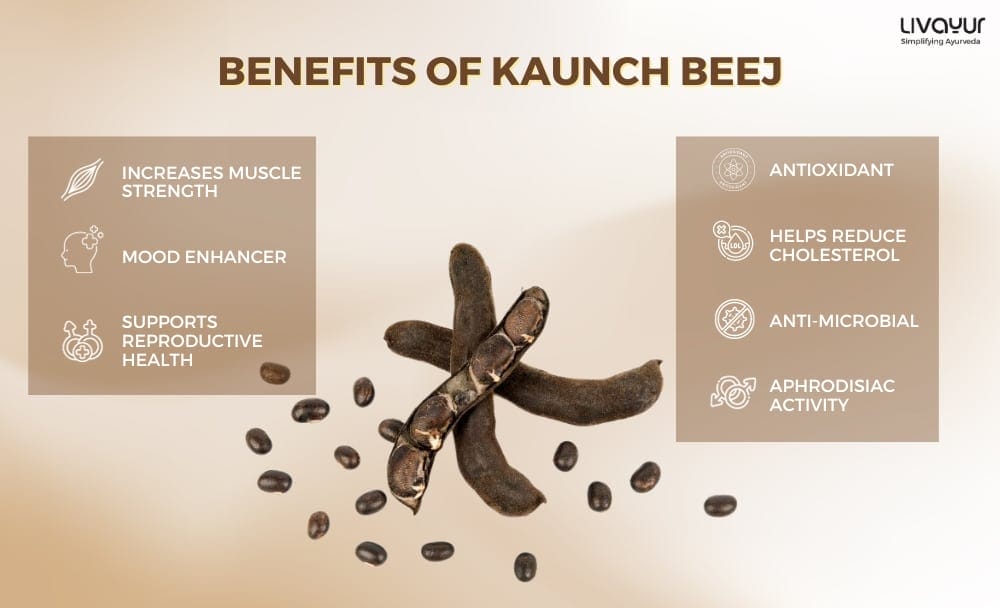
Kaunch Beej, also known as Mucuna pruriens or “cowhage plant”, is a tropical legume native to most parts of the subcontinent and can be found in hedges and bushes all across the plains of India.
Kaunch beej benefits have been harnessed in traditional medicine systems like Ayurveda for centuries due to its potential health benefits.
Kaunch Beej uses is primarily recognized for its nutritional composition and active constituents, such as mucunadine, mucuadinine, pruriendine, and nicotine, all of which contribute to its medicinal properties. [1]
In this article, we will explore further the nutrition, Kaunch Beej benefits, uses, and potential side effects of Kaunch Beej.
Nutritional value of Kaunch Beej
This legume has a high content of lipids, minerals, carbohydrates, fiber as well as amino acids. Mucuna beans or Kaunch Beej are rich in minerals, particularly potassium, magnesium, calcium, iron, sodium, phosphorus , copper, zinc and manganese.
Different proteins and amino acids are also found in ‘kaunch’, such as threonine, proline, tyrosine, phenylalanine, tryptophan, glutamic corrosive, aspartic corrosive, serine, lysine, histidine and arginine. [2]
Table to represent Nutritional Value of Mucuna Beans (Kaunch Beej):
| Nutritional properties | Composition |
| Crude protein | 24–31.44% |
| Crude carbohydrate | 42.79–64.88% |
| Crude lipid | 4.1–14.39% |
| Crude fiber | 5.3–11.5% |
| Ash | 2.9–5.5% |
| Potassium | 0.806–2.790% |
| Sodium | 4–70 mg/100 g |
| Calcium | 104–900 mg/100 g |
| Phosphorus | 98–498 mg/100 g |
| Magnesium | 85–477 mg/100 g |
| Iron | 1.3–15 mg/100 g |
| Copper | 0.33–4.34 mg/100 g |
| Zinc | 1–15 mg/100 g |
L-dopa, which makes up about 5% of the phenolic chemical content of mucuna seeds, is known to be the primary content of mucuna seeds.
Since L-dopa is a medication used as a first-line treatment for Parkinson’s disease, mucuna is currently the subject of a lot of research.
According to some research, when given to Parkinson’s patients, L-dopa extracted from M. pruriens offers numerous advantages over synthetic L-dopa, which has a number of negative effects with prolonged use. [3]
Some Amazing Benefits of Kaunch Beej You Must Know
The potential Kaunch Beej benefits are diverse and have been studied for various purposes. It is used in conditions such as Parkinson’s disease, worm infestation, and loss of libido in men. The benefits of kaunch beej powder are also known for increasing the body’s nerve function and helping to reduce psychological stress. Some of the commonly reported uses and Kaunch Beej benefits include:
1. Helps in the management of Parkinson’s disease
Due to its L-dopa content, Kaunch Beej benefits have been investigated for its potential in managing the early symptoms of Parkinson’s disease, an otherwise non-curable disorder. [1]
2. Is a natural mood booster

The benefits of kaunch beej are many. The L-dopa in Kaunch Beej may positively influence mood and cognitive function by supporting dopamine levels in the brain. It is often used as a natural mood enhancer and to promote a sense of well-being. Owing to the presence of L-dopa and its impact on nervous system, it is also used to treat nervous disorders. [1][6]
3. Promotes Male Virility
The kaunch beej benefits for males include its longstanding traditional medicinal value in supporting fertility and reproductive health in both men and women.
It is believed to enhance libido, improve sperm quality, and support overall sexual function, including the desire for sex, penile rigidity, erection of genitals, and increased semen ejaculation duration with orgasm. [4]
4. Increases muscular strength
Kaunch Beej benefits include its ability to give the body endurance and improve muscular strength.
This makes the Kaunch Beej a vital component among many athletes who use the supplements to enhance their body performance, reduce body fat, and increase the muscle mass of the body. [4]
5. Hormonal balance
Some studies suggest that Kaunch Beej may positively impact hormone regulation. It is famous for its aphrodisiac activity by increasing testosterone levels in the body, which ultimately increases the sperm count making the kaunch beej benefits for males extremely popular. [4]
6. Anti-venom activity
Among the several Kaunch Beej benefits is its anti-venom activity, The Mucuna pruriens or Kaunch seeds can neutralize the effect of venom. [5]
7. Helps reduce cholesterol levels
Kaunch Beej has also shown hypoglycemic activity due to its squalene content which helps lower cholesterol and creatinine levels. [4]
8. Antioxidant and anti-microbial effects
The bioactive compounds in Kaunch Beej exhibit antioxidant and anti-microbial properties, which may help reduce oxidative stress, inflammation, and cell damage in the body. [4]
9. Exhibits potent Anti-diabetic activity

M. pruriens seeds used at a dose of 500 mg/kg reduced plasma glucose levels. If the studies are to be believed, kaunch beej or the velvet beans exhibit anti-diabetic properties by lowering the blood sugar levels at a particular dosage which might vary based on individual conditions. [2][6]
How to consume Kaunch Beej [2][6]
- The benefits of kaunch beej powder can be harnessed in the form of powder or churna.
- It can be taken either with milk, honey or lukewarm water.
- It is also consumed in the form of Kaunch Pak granules. Kaunch Pak granules helps in building a b immune system and embodies aphrodisiac action. It may also be proven useful in enhancing sexual strength and stamina and improve one’s endurance.
- It may also be proven useful in enhancing sexual strength and stamina and improve one’s endurance.
Dosage of Kaunch Beej [2][6]
- Take 1/4 to 1/2 teaspoon of Kaunch beej powder with honey.
- It is best to have it after dinner and lunch.
- If you have diabetes, swap the honey with warm milk or water.
- If you want to consume it with milk, take 1/4 to 1/2 teaspoon of Kaunch beej powder, mix it with a cup of milk and boil it for 3-5 minutes to gain the maximum kaunch beej benefits.
Potential kaunch beej side effects [2][6]
- While Kaunch Beej offers a spectrum of benefits, it is very crucial to approach its use with complete awareness. Potential side effects may include nausea, digestive discomfort, or reactions/allergic effects when combined with certain medications. This isn’t an exhaustive list of side effects either. There maybe some unforeseen side effects based on various medical conditions of different individuals. Consulting a healthcare professional before incorporation is advisable.
- Kaunch beej, although lauded for its restorative effect, has one more side effect worth discussing. However, this side effect is particularly harmful for cattle (cows, buffaloes etc.) and the animals that ruminate their food. It is poisonous when ingested by ruminants.
- The presence of antinutrients in Kaunch Beej is a hindrance to its progress as a food or nutrition source, since anti-nutrients are more prevalent in these magic velvet beans than in other rare vegetables.
- The hair on the pods of kaunch Beej is considered extremely unsafe. As the hair have a stinging effect on the skin causing harsh itching, stabbing sensation and inflammation.
- Pregnant women or new mothers should avoid intaking Kaunch Beej as there is no research conducted on whether it is safe for pregnancy and child’s health or not.
Precautions to take while consuming Kaunch Beej [2][6]
- Keep it away from children, pregnant women and lactating mothers.
- Do not feed it to your cattle.
- If you’ve any health allergies, please consult your doctor before intaking Kaunch beej churna.
- Treat pods of Kaunch carefully, as the hair on the pods are poisonous.
From where you can buy Kaunch Beej and its Prices
| Product | Online Shop / Stores | Price (for 100 gm) |
| Vyas Kaunch Beej Churna | Apollo247 | ₹95/- |
| Baidyanath Kaunch Pak Forte Granules | Baidyanath | ₹111/- |
| Dhanwantri Kaunch Beej Churan | 1mg | ₹62/- |
| Jagriti herbs Kaunch Pak Granules | Flipkart | ₹106/- |
| Patanjali Konch Beej Churna Shuddh | Amazon | ₹43/- |
| Bixa Botanical Kaunch Beej Powder | JioMart | ₹118/- |
FAQs
1. How can Kaunch Beej be used?
Kaunch Beej can be used as a seed extract, cooked seeds, seed concoction, and in a Kaunch Beej powder form.
2. Can Kaunch Beej bring about weight loss?
The Kaunch Beej benefits have been known to include an effect on weight loss therapy. The seeds have the potential to enhance body composition by facilitating appropriate changes in adipose tissue and liver due to obesity.
3. Are there any side effects of intaking excessive Kaunch Beej?
While Kaunch Beej offers a spectrum of benefits, it is very crucial to approach its use with complete awareness. Potential side effects of usage may include nausea, digestive discomfort, or reactions/allergic effects when combined with certain medications.
This isn’t an exhaustive list of side effects either. There maybe some unforeseen side effects based on various medical conditions of different individuals.
Other than this, the Kaunch Beej are really harmful for ruminants if ingested orally and there are a lot of anti-nutrients present in Kaunch Beej, hindering its pathway to being the wonder food of present times. Pregnant women and new mothers should strictly avoid using Kaunch beej for any and all purposes.
4. What are the benefits of Kaunch beej for Parkinson’s disease?
With its L-dopa component, Kaunch Beej has recently shown promise in treating Parkinson’s disease. However, given the severity of the illness, appropriate medical attention is required.
5. What are the benefits of Kaunch beej for Arthritis?
Powdered kaunch beej may be useful in the treatment of arthritis. It possesses analgesic and anti-inflammatory qualities. These characteristics aid in lowering joint discomfort and swelling.
Conclusion
Delving into the nutritional tapestry, Kaunch Beej reveals a wealth of lipids, minerals, and amino acids, showcasing its diverse benefits. L-DOPA, a primary component, takes center stage, holding promise for Parkinson’s patients. From enhancing male fertility to serving as an antidote for snake venom, combating nervous disorders, and exhibiting anti-diabetic and antioxidant properties, Kaunch Beej unfolds as a holistic ayurvedic solution with its roots in ancient Indian History of herbal medicines.
Yet, as with any potent remedy, caution is advised. Potential side effects necessitate an informed approach, emphasizing the importance of consulting healthcare professionals before incorporating Kaunch Beej into one’s wellness journey. On your physician’s advice, unlock the potential of this natural gem and make your wellness your number one priority.
Disclaimer:
This article is written from a health and wellness perspective and is not medical advice. Kindly seek the help of a certified medical practitioner before initiating any treatment.
References
- Mucuna pruriens (Konch Beej) precipitates manic symptoms
- An assessment of potential nutritive and medicinal properties of Mucuna pruriens: a natural food legume.
- Mucuna pruriens in Parkinson’s disease: a double blind clinical and pharmacological study
- Kapikacchu (Mucuna pruriens): A Promising Indigenous Herbal Drug and Its Effect on Different Disease Conditions
- MP-4 Contributes to Snake Venom Neutralization by Mucuna pruriens Seeds through an Indirect Antibody-mediated Mechanism
- The Magic Velvet Beans


















